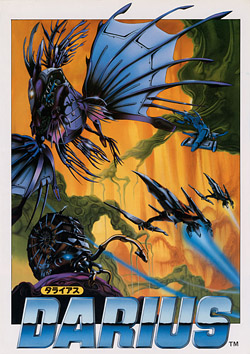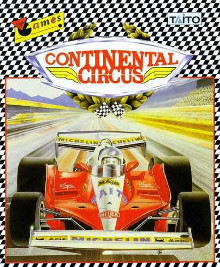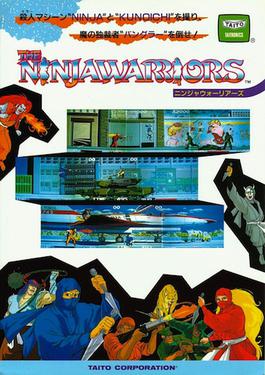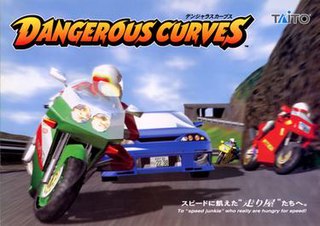
Arkanoid is a 1986 block breaker arcade game developed and published by Taito. In North America, it was published by Romstar. Controlling a paddle-like craft known as the Vaus, the player is tasked with clearing a formation of colorful blocks by deflecting a ball towards it without letting the ball leave the bottom edge of the playfield. Some blocks contain power-ups that have various effects, such as increasing the length of the Vaus, creating several additional balls, or equipping the Vaus with cannons. Other blocks may be indestructible or require multiple hits to break.

Darius Gaiden is a 1994 horizontal-scrolling shooter arcade game developed and published by Taito. The fifth entry in its Darius series, players control a starship named the Silver Hawk in its mission to destroy the Belsar empire before it wipes out the population of planet Darius. Gaiden adds several new features to the core concepts of its predecessors, including screen-clearing black hole bombs and the ability to capture mid-level bosses. The game has been ported to several consoles, including the Sega Saturn and PlayStation.

Darius is a 1987 horizontal-scrolling shooter arcade game developed and published by Taito. Players control a starship named the Silver Hawk in its mission to destroy the Belser empire before they wipe out the planet Darius. Its gameplay involves traversing through a series of scrolling levels while destroying enemies and collecting power-up icons. It is notable for its unique three-screen panoramic display, upbeat soundtrack, and cute anime-influenced graphics.

Bubble Symphony, also known as Bubble Bobble II, is an arcade video game in the Bubble Bobble series developed by Taito in 1994. While being a new Bubble Bobble for a new generation, it takes place after Parasol Stars.

The Fairyland Story is a platform arcade video game developed and published by Taito in 1985. In the game, the player controls the witch Ptolemy, with the objective being to clear the screen of all enemies. Ptolemy can use her wand to turn the enemies into large cakes, which she can then push off of platforms onto other enemies, which will squash them and award bonus points. Various items that increase Ptolemy's projectile radius, as well as kill multiple enemies at the same time, will also appear throughout the stages.

Continental Circus is a racing simulation arcade game, created and manufactured by Taito in 1987. In 1989, ports for the Amiga, Amstrad CPC, Atari ST, Commodore 64, MSX and ZX Spectrum were published by Virgin Games.

RayForce is a vertically scrolling shooter by Taito for the Taito F3 arcade hardware and released in 1994. It was ported to the Sega Saturn in 1995, Microsoft Windows in 1997, then rereleased for iOS in 2012 and Android in 2017.
The Taito Type X is an arcade system board released in 2004 by game developer and publisher Taito.
Darius is a shoot 'em up video game franchise developed and published by Taito. The eponymous first game was released in February 1987 for arcades, and has since been followed by six sequels and several spin-offs. The series takes place during the events of a war between humans and the Belsar empire, which plot to destroy all that is left of mankind. Darius is known for its branching stage paths, upbeat soundtrack, and cute sea life-inspired enemies.

RayStorm is a 1996 vertically scrolling shooter arcade video game developed and published by Taito. It has been ported to several consoles, including the PlayStation, Sega Saturn, and Xbox 360. Players control a starship, the R-Gray, in its mission to destroy the Secilia Federation before it destroys Earth.

The Ninja Warriors (ニンジャウォーリアーズ) is a side-scrolling beat 'em up video game developed and released by Taito in 1987. The original arcade game situated one display in between projected images of two other displays, creating the appearance of a triple-wide screen. Ports were released for home systems including the Amiga, Atari ST, ZX Spectrum, Commodore 64, Amstrad CPC, PC Engine, and Sega Mega-CD.
Hisayoshi Ogura is a former member of Taito Corporation's "house band" Zuntata. He is best known for his musical compositions in the Darius arcade series. His musical style is often experimental electronica. However, in Zoids Infinity Ex he focused on more on an orchestrated soundtrack. His Darius compositions range from cutesy, heartfelt denpa-style songs to rather powerful ones. His music for the Darius series can vary in style. For example, the music for Darius Gaiden is dark and gloomy, while the music for G-Darius is more carefree and upbeat. He also created the soundtrack to Ninja Warriors and voiced the character Marco in Kaiser Knuckle.

Metal Black is a 1991 scrolling shooter arcade video game originally developed and published by Taito. Set in the dystopian future of 2052, players assume the role of rogue pilot John Ford taking command of the CF-345 Black Fly space fighter craft to defeat the Nemesis alien race and save humanity.

Gun Frontier is a 1990 vertically scrolling shooter arcade video game developed and originally published by Taito in Japan. Set on the fictional planet of Gloria in the 22nd century, where an alien race of space pirates known as the Wild Lizards have invaded the location and enslaved its inhabitants for gold extraction, players assume the role of settlers who were part of the planet's colonization team taking control of revolver-shaped fighter aircraft in an attempt to overthrow the invaders and free their surviving civilization from slavery.

Space Gun is a 1990 first-person shooter arcade game released by Taito. The game is set aboard a crippled space station that has been overrun by hostile alien creatures. The objective is to rescue human crew members while destroying the alien creatures. The game lets the player shoot limbs off the creatures, resulting in blood splatters.

Qix++ is a video game developed and released by Taito for Xbox Live Arcade on December 9, 2009 and the PlayStation Portable on February 25, 2010 exclusively in Japan. It is the fifth game in the Qix series, and adds several new features, such as different Qix types, powerups, and new enemies. The Xbox 360 version of Qix++ was added to the Xbox Backwards compatibility list on September 8, 2016 making it 100% compatible with Xbox One and later, the Xbox Series X and series S. As of December 25, 2021 it was still available to buy on the Xbox Game Store.

The Groove Coaster series is an iOS / Android and arcade rhythm game franchise developed by Matrix Software and published by Taito. The first Groove Coaster was released for iOS on July 28, 2011. This rhythm game follows a roller coaster type track on screen, where players must make the appropriate controller inputs. Like many rhythm games, a life bar is attached to the game play. Players gain or lose points on the bar depending on the input timings.

Night Striker is a 1989 shoot 'em up video game developed and published by Taito for the Taito Z System. In the game, the player flies an armoured car shooting enemy invaders to destroy a terrorist organisation. Night Striker combines gameplay elements of Sega's Space Harrier and Out Run. Versions were released for the Sega Mega-CD in 1993, Sony PlayStation in 1995, and Sega Saturn in 1996. A version was released on the Taito Memories II Gekan compilation for the PlayStation 2 in 2007. Night Striker received mixed reviews, and the Mega-CD version in particular was heavily criticised, primarily due to poor graphics. The music was composed by Taito's Zuntata sound team, and has been released separately.

Dangerous Curves is an arcade racing game developed and published by Taito. The arcade cabinet is constructed to allow players to choose between simulating either a car or a motorcycle and then race other vehicles on a variety of courses.
Tamayo Kawamoto, also simply known as TAMAYO, is a Japanese video game music composer. During her time at Capcom, she wrote music for games. After leaving Capcom in 1988, she joined Taito and became a member of their in-house band, Zuntata. She later joined up with Japanese singer Cyua to form the group Betta Flash.















